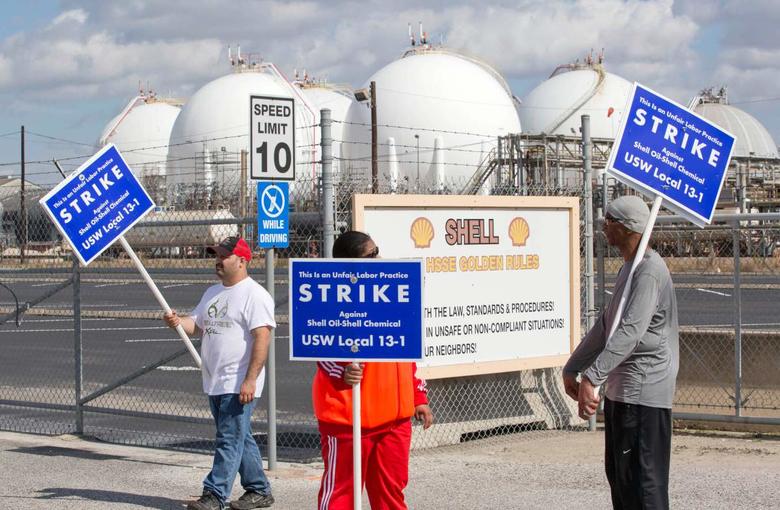
OIL WORKERS STRIKE

The days of plenty for thousands of North Sea oil workers are over. Big operators are ending a longstanding "two weeks on, three weeks off" regime and have told crews to work longer offshore shifts after a collapse in crude prices.
Trade unionists have warned they are ready to ballot on industrial action after companies including US-based groups Apache and Marathon , Talisman Sinopec and Canadian Natural Resources requested the move to a more demanding shift pattern.
Operators have asked crews to sign up to a "three weeks on, three weeks off" or equal time rota, viewed in the industry as tougher than the regime in Norway but comparable with conditions in the Gulf of Mexico. The changes will save companies money as fewer staff are needed on platforms.
Union officials warned several thousand jobs could be at risk after they were told at a meeting with Oil & Gas UK, the offshore industry body, that member companies may introduce the shift changes across the North Sea. It is thought that Royal Dutch Shell and France's Total are among other operators looking at such a move.
The cost-cutting comes as the energy industry grapples with what BP has warned could be the worst slump since the 1980s, with the impact on the North Sea's ageing fields likely to be severe. Thousands of self-employed workers have already had their pay cut by up to 15 per cent — the average offshore wage was $94,000 in 2013, according to a survey by recruitment group Hays.
Letters sent to employees, seen by the Financial Times, have outlined plans to make workers redundant as part of the changes. One letter, from Archer, the oilfield services group, sent to workers in the Forties field, Britain's biggest and operated by Apache, warned that any employees who failed to agree to the changes, effective from April 1, "will immediately be considered at risk of redundancy".
Some letters make it clear that holidays must now be taken in the periods that employees are onshore. Annual pay could be increased, albeit at "revised rates".
CNR, which operates fields including Ninian and Murchison, has told staff in the past few days it is preparing to move to a "three weeks on, three weeks off" rota.
EnQuest , the North Sea producer, has confirmed it is looking at a similar move. "The industry is facing up to the challenges of the current environment and pulling the levers it can to reduce costs. It's a battle of the fittest and, unfortunately, the industry is starting from a very high cost base," said Amjad Bseisu, its chief executive.
Apache, which also operates the Beryl oilfield, said that while it would use fewer rigs and contractors, it would be "one of the more active drillers" in the North Sea. Marathon, which operates Brae, said it had told contractors it was moving to equal time rotas, arguing that this was "imperative" to lower costs.
However, the RMT union's Jake Molloy called any efficiency gains "economics of the madhouse", saying employees were being asked to work an extra 28 days a year for no more pay, while the workforce would be cut by a fifth.
Union officials said catering staff might soon join drillers and construction workers in the proposed changes, which could cover as many as 20,000 workers.
Unite's Tommy Campbell said safety could be compromised: "There's no way anyone would expect to see a lorry driver working three weeks through, 12 hours a day without a break, or a doctor, or a nurse. So why do companies feel it's safe to do so offshore? If there's no solution to the dispute, the union will have no alternative but to ballot for industrial action."
The Offshore Contractors' Association is due to hold talks next week with representatives from Unite and the GMB unions to try to resolve the dispute. It said suggestions of strike action were premature.
ft.com





